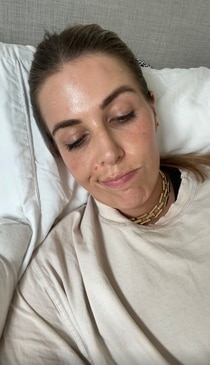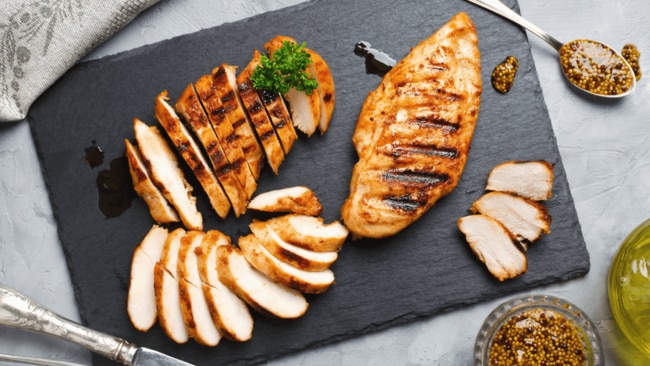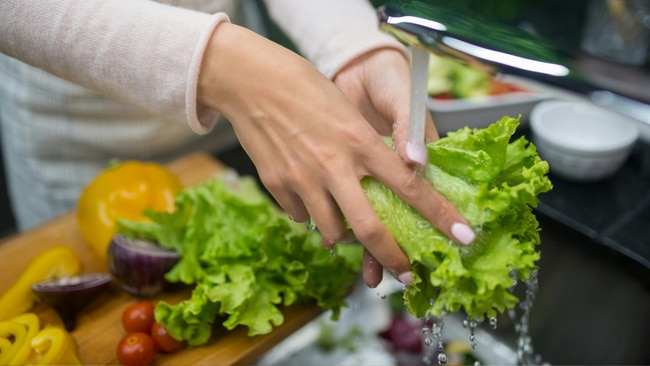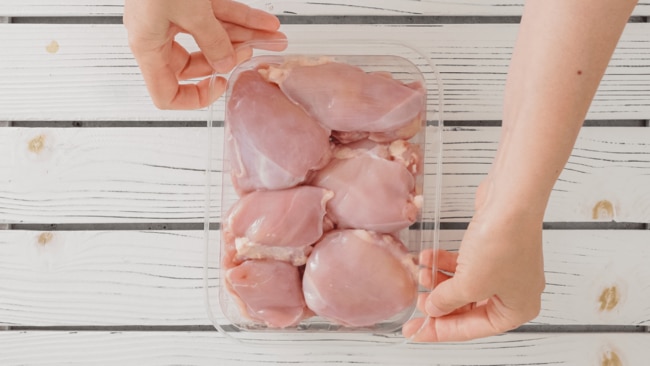The weird reason you should never wash raw chicken
Is it really worth the risk?

Lifestyle
Don't miss out on the headlines from Lifestyle. Followed categories will be added to My News.
No one wants to enjoy their favourite dish with a side of nasty food poisoning. But, is washing your raw poultry before cooking it in the name of hygiene doing more harm than good?
Many factors contribute to a memorable home-cooked meal.
A memorable home-cooked meal depends on several factors, such as the quality of ingredients used, the aesthetic appeal of your matching serving dishes, and the company you choose the share each forkful of flavour with.
Any chef– professional or amateur– wants their cooking to be remembered for the right reasons, not for unleashing a weekend of food poisoning on unsuspecting guests.
While it may not be the most glamorous aspect of culinary exploration, hygienic food preparation is no doubt the most important part of cooking. So, how can one simple action put your entire kitchen at risk?

In the grand scheme of things, it’s important to remind ourselves it has only been a few years since we were wading through the depths of the Covid pandemic, a time when our hygiene hysteria had us scrubbing clean every item that entered our homes.
As case numbers rose, stores across the world were subsequently cleaned out of hygienic sprays, wipes, and sanitisers, reflecting our involuntary shift towards manically cleaning every inch of our lives.
These hygienic habits (both newfound and reaffirmed) were applied to each area of our homes, with our kitchens being no exception. But has our obsession with cleanliness taken our food preparation practices to dangerous new heights?
Here’s why washing raw poultry before cooking could open your kitchen up to serious cross-contamination.

The problem with washing chicken
Chicken, arguably the most common poultry staple in any kitchen, is one of the most popular (and versatile) ingredients on a variety of cultures’ menus. However, as affordable, delicious, and readily available as chicken may be, the meat in its uncooked form is often home to harmful bacteria.
While most foods carry the risk of contamination, some strains of bacteria found in raw chicken, such as salmonella and campylobacter, can be especially detrimental to humans if ingested.
Unfortunately, unlike a dirty bag of lettuce leaves, rinsing the surface of your raw chicken in the kitchen sink won’t rid the item of harmful pathogens. In fact, the only way to effectively eliminate bacteria in raw chicken is by cooking it off.
But the risk of cross-contamination exists beyond the meat itself, with any surface that comes in contact with raw chicken needing to be sterilised too. This includes any knives, plates, chopping boards and yes, you guessed it, the kitchen sink.

Washing raw chicken under the tap not only has little to no impact on the presence of pathogens in the meat, but also increases the chance of salmonella-infested droplets splashing onto your counter, faucet, and surrounding items.
In essence, washing raw poultry is a counterintuitive practice, only increasing the chances of cross-contamination on both the item and in the surrounding environment.
As one study explores, people who do wash their chicken tend to do so out of traditional obligation, continuing a practice of preparation founded by generations before them. For example, just a few generations ago, families would commonly slaughter and pluck birds themselves for dinner, making a quick rinse under the tap necessary.
But, as the study’s authors explain, the introduction of mass-produced, ready-to-cook poultry meat and modern kitchen appliances have essentially rendered this unhygienic practice obsolete.

The best way to prepare a chicken dish
So, what is the safest way to handle, prepare and cook raw chicken in the kitchen? Well, according to the Australian Chicken Meat Federation, there are some simple steps to follow, from the day you purchase your chicken, to the moment it hits the pan.
As a general rule, raw chicken should only be stored in the fridge for a few days, so if your weekly menu won’t be featuring your famous chicken tacos until later in the week, it’s best to store the poultry in the freezer immediately after purchasing.
When thawing frozen raw chicken, it is safest to use the fridge or microwave rather than leaving it out on the kitchen bench to defrost or soaking it in water.
The best way to steer clear of cross-contamination when preparing and cooking chicken is by using separate utensils and cutting boards for your poultry and other foods. Also ensure your meat is cooked thoroughly, using a meat thermometer to check that the thickest part of the chicken has a temperature of at least 75 degrees Celsius.
More Coverage
Originally published as The weird reason you should never wash raw chicken





